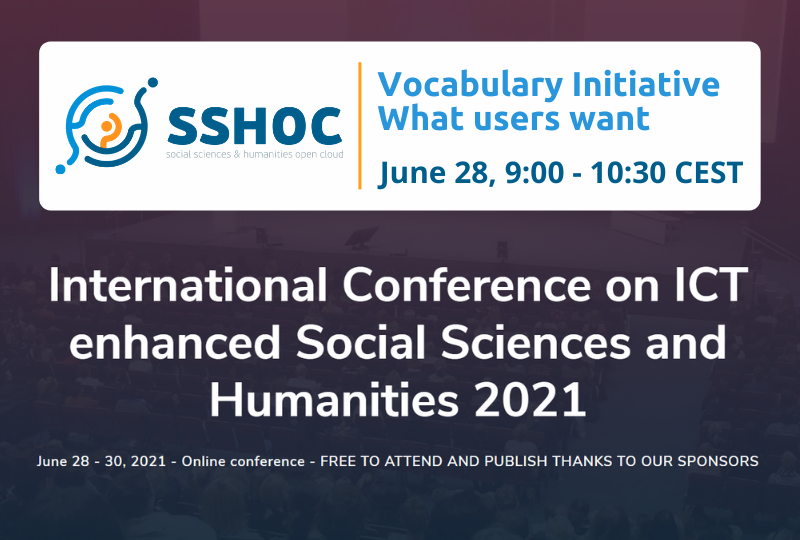
- Social Sciences & Humanities Open Cloud
SSHOC Vocabulary Initiative - What users want (ICTeSSH 2021 SSHOC session)

Date:
28 June 2021 - 09:00 to 10:30
Location:
Online
SSHOC will build the Social Sciences and Humanities part of the European Open Science Cloud. One of the SSHOC project’s core objectives is to foster the transition from the current Social Sciences and Humanities landscape to a cloud-based infrastructure that will operate according to the FAIR principles, offering access to research data and related services adapted to the needs of the Social Science and Humanities (SSH) community. Furthermore, the tools, services, repositories and other resources brought in by the project partners or generated during the project will be featured in the SSH Open Marketplace.
The SSH European Research Infrastructure Consortia (ERICs) partnering in SSHOC are exploring and enabling collaboration and deeper integration of each other’s infrastructures. One topic that is of relevance for all SSHOC SSH stakeholders is that of managing and using vocabularies. Here we use vocabularies as a general term covering a range of semantic artefacts such as wordlists, taxonomies and thesauri.
The SSH vocabularies are essential for a proper description of resources and phenomena and in SSHOC many tasks are concerned with them. In SSHOC, a specific “Vocabulary Initiative” was launched last year to coordinate related vocabulary activities and investigate, inform and exchange expertise on vocabularies and the platforms that are hosting and managing them. Therefore, the proposed workshop will have the following main objectives:
- To engage the SSH end-user communities present at ICTeSSH in the SSHOC Vocabulary Initiative, to collect their input and feedback on managing vocabularies, and vocabularies as FAIR semantic artefacts.
- To raise awareness in the SSH research community present at ICTeSSH on finding, understanding and reusing vocabularies via the SSH Open Marketplace.
This workshop will consist of several presentations that will the following topics:
- Vocabularies and their use in the SSH community: Given the breadth of the Social Sciences and Humanities sector, it is of no surprise that researchers are faced not only with a multitude of theoretical and empirical approaches to research but also with an enormous pool of various tools, systems, and resources that are intended to help researchers in their endeavours.
- Managing Vocabularies: Recently, SSHOC and CLARIN organised a series of info sessions and a workshop to discuss the respective merits of different available vocabulary management platforms. This presentation will give an overview of the platforms, highlighting the differences and their impact on data aggregation, discovery and access.
- Vocabularies as FAIR semantic artefacts: In the data management landscape, vocabularies and their interrelations have not always been considered as primary data themselves. Nowadays, they are considered an essential part of data processing that should be made FAIR as other research data. There are currently numerous initiatives that register vocabularies to make them ‘findable’ and ‘accessible’ while interoperability can be provided by existing standards.
- Using Vocabularies in different SSH tools, such as:
- SSHOC Dataverse,
- CLARIN metadata component registry and the
- ADS Vocabulary Matching tool
- Finding vocabularies via the SSH Open Marketplace: The more established and well-known vocabularies are, the more useful they are because the users are better acquainted with them and thus better understand their structure and the meaning of individual concepts. Moreover, reuse of vocabularies is crucial for achieving semantic interoperability between systems and datasets. One could even argue that controlled vocabularies are only used to their full potential if they are being reused. This is why researchers can find vocabularies as individual semantic artefacts, as items of the Marketplace.
The conferenece website is here.
Downloaded the slides here.
Draft Agenda
|
Time |
Title |
Speaker |
|
9.00-9.10 |
The SSH-SSHOC Vocabulary Initiative |
Daan Broeder (CLARIN) |
|
9.10-9.40 |
How can researchers use Vocabulary in SSH tools & use cases
USABILITY: Using Vocabularies in the SSH community - Iulianna van der Lek (CLARIN)
FINDABILITY: Current ways of locating suitable vocabularies Matej Ďurčo (DARIAH)
INTEROPERABILITY: Vocabulary Matching Tool Holly Wright) 5 min INTEROPERABILITY: Use of MT for creating multilingual vocabularies Monica Monachini (CLARIN) |
Moderator: Marieke Willems (Trust-IT)
|
|
9.40-10.25 |
Slid.do with the audience & panel discussion SSH Vocabulary Initiative - What users want
|
Modateraor: Marieke Willems (Tust-IT) Panelists:
|
|
10.25-10.30 |
Wrap up |
Daan Broeder (CLARIN) |
Presentations:
